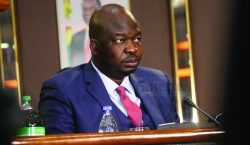



Sim Tshabalala, Standard Bank Group Chief Executive.
Results for the year ended December 31 2016 at a glance:
Headline earnings: R23 009 million, up 4%
Headline earnings per share (HEPS): 1 440 cents, up 4%
Total dividend per share: 780 cents per share, up 16%
Total capital adequacy ratio: 16.6% (2015: 15.7%)
Net asset value (NAV) per share: 9 433 cents (2015: 9 433 cents)
Return on equity (ROE): 15.3%, down from 15.6% in 2015
Cost-to-income ratio: improved marginally from 56.5% to 56.3%
Credit loss ratio: 86bps, in line with the 87bps recorded in the prior year
STANDARD Bank Group, which wholly owns Stanbic Bank Zimbabwe, continued to grow its businesses both in South Africa and in its Africa regions franchise for the year ended 31 December 2016, despite the elevated levels of macro, political and policy uncertainty experienced in many of the markets in which the group operates.
During the year under review the group’s Africa regions franchise contributed 30 percent to the group’s total income and 25 percent to the group’s headline earnings.
The group’s banking activities headline earnings grew by nine percent to R22 062 million and delivered an ROE of 16,8 percent, up from 16,3 percent in the prior year.
Operating environment
2016 was a tumultuous year. Globally, the ambiguity in the run-up to the UK’s “Brexit” vote and the US election, as well as the contrarian outcomes, drove uncertainty and volatility. During the year, China’s policy stimulus continued and growth stabilised, providing some support to commodity prices, while OPEC’s decision to trim output helped to lift oil prices.
In sub-Saharan Africa, widespread drought in east, central and southern Africa continued, which placed strain on food supply and drove inflation. Oil-export reliant countries remained constrained on the back of low prices, and many countries tightened monetary policy in an attempt to control inflation. Despite these headwinds, the more diversified oil-importing east African countries continued to offer better macro prospects, attract investment and outperform.
In South Africa, the threat of a sovereign downgrade by rating agencies to sub-investment grade persisted throughout the year. This in turn negatively impacted the already weak business and consumer confidence and further delayed much needed domestic investment and job creation opportunities. Politically driven actions added to uncertainty and heightened international investor caution. Inflationary pressures brought about by the drought and the weak exchange rate placed additional pressure on already constrained consumers.
Business units
Personal & Business Banking (PBB)
PBB’s headline earnings grew by 12% to R12 630 million. Strong net interest income (NII) growth of 14% and non-interest revenue (NIR) growth of 8% translated into total income growth of 11% to R67 480 million. Credit impairment charges were 3% higher than in 2015. Operating expenses increased by 11%, of which the Japan fraud incident, the increase in permanent employees to comply with legislation, and higher information technology systems related amortisation contributed 2% to the operating expenses growth. PBB’s ROE increased to 18.7% from 18.2%. PBB South Africa’s headline earnings rose by 11% to R11 769 million, PBB International increased by 21% to R558 million and the PBB Africa regions headline earnings increased by 66% to R303 million.
Corporate & Investment Banking (CIB)
CIB’s headline earnings grew by 16% to R10 558 million. Total income grew by 12% to R35 249 million, with client revenue growing by 10%. CIB’s focus on multinational corporates is paying dividends and revenue from these customers contributed approximately 60% to total revenues. NII increased 25%, while diligent cost management delivered cost growth of 7% and strong positive JAWs of 5%. CIB’s continued disciplined approach to capital allocation resulted in ROE improving to 20.0% from 18.0% in the prior year.
Other banking interests
Headline earnings loss from the group’s other banking interests improved to a net loss of R8 million, from R569 million in the prior year. The headline earnings contribution from the group’s 20% interest in ICBC Argentina declined 3% year-on-year to R583 million. The equity-accounted headline loss from the group’s interest in ICBCS reduced from R1 173 million in 2015 to R591 million in 2016.
Liberty
Liberty’s normalised headline earnings for the year decreased by 39% to R2 527 million, affected by lower returns from investment markets and a challenging consumer environment. Liberty’s IFRS headline earnings attributable to the group, adjusted for the impact of the Liberty deemed treasury shares, decreased by 61% to R955 million.
Prospects
The economic growth momentum that built towards the end of 2016, driven by China and the US, has continued into the start of 2017. Global trade activity should pick up on the back of policy stimulus and a gradual normalisation of large economies, such as Brazil and Russia. However, uncertainty surrounding US policy direction under the new administration, Brexit negotiations and the broader European macro outlook may pose downside risks to global growth prospects.
Sub-Saharan Africa’s GDP growth is expected to be 2.8%, buoyed by global trade, resource demand and improved economic prospects generally. South Africa’s forecast growth at 1.5% is an improvement, but remains subject to event risks, such as rating agency and political decision points during the year.
“With these dynamics in mind, we look to our clients, to the challenges and opportunities they may face, and seek ways to partner with them on their journeys in 2017 and beyond. As we focus on delivering market-leading client experiences, we continue to invest in our client-facing digital capabilities to enable our clients to transact independently and safely anytime anywhere,” says Sim Tshabalala, Standard Bank Group Chief Executive.
With regards to Liberty, Standard Bank is working closely with its board and management and is supportive of their efforts to address their shorter term challenges relating to sales, the competitiveness of Liberty’s product suite and ongoing cost management.
In April 2015 the South African Competition Commission announced that it had initiated a complaint against Standard New York Securities Inc (SNYS) and 21 other institutions concerning possible contravention of the Competition Act in relation to USD/ZAR trading between 2007 and 2013. No mention was made of The Standard Bank of South Africa Limited (SBSA). On 15 February 2017 the Competition Commission lodged five complaints with the Competition Tribunal against 18 institutions, including SBSA and SNYS, in which it alleges unlawful collusion between those institutions in the trading of USD/ZAR. Standard Bank only learned of the SBSA-related complaints at this time and are engaging with the Competition Commission to better understand the basis for the complaints and the appropriate response. Standard Bank considers these allegations in an extremely serious light and remains committed to maintaining the highest levels of control and compliance with all relevant regulations. The allegations are confined to USD/ZAR trading activities within SBSA and do not relate to the conduct of the group more broadly.
“As we look to the year ahead, we remain steadfast in our commitment to doing the right business the right way. In this context, we continue to embed a culture of responsible business practices. We remain committed to delivering through-the-cycle headline earnings growth and ROE within our target range of 15% – 18% over the medium term. In order to do so, we recognise the need to balance prudent capital management with appropriate return-based resource allocation and leverage,” says Ben Kruger, Standard Bank Group Chief Executive.